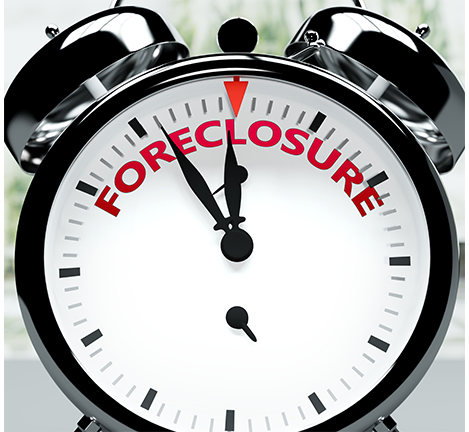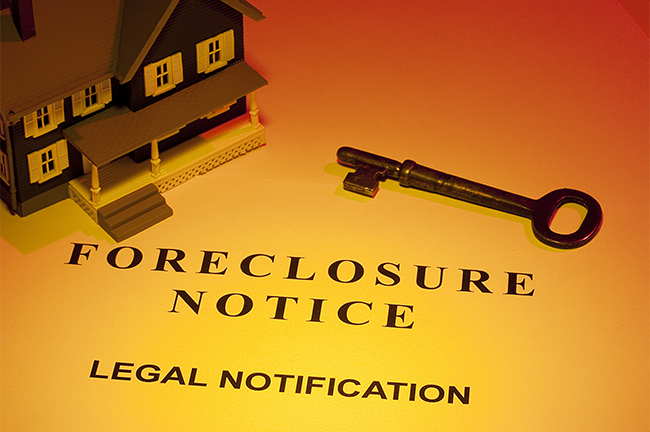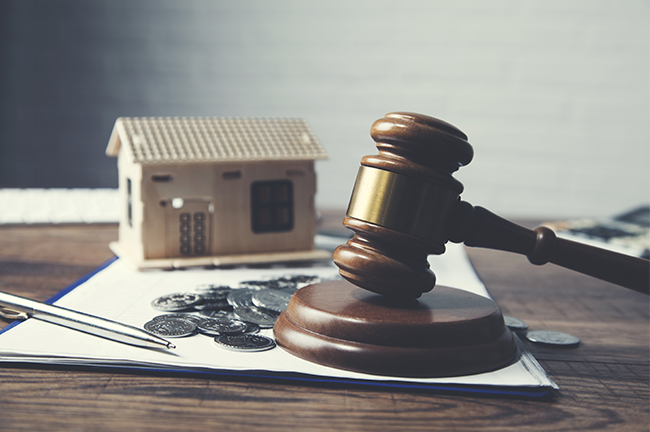
If you are a homeowner facing foreclosure in New Jersey, it is important that you understand how the foreclosure process works. This article will outline the general steps in foreclosures in NJ and hopefully answer some common questions. Every situation is different, so it is important to speak with an experienced foreclosure defense attorney early in the process to keep your options open and help you save your home.
In New Jersey, the mortgage lender cannot automatically take your house when you don’t pay your mortgage. The lender must follow certain steps which are set forth in the New Jersey Fair Foreclosure Act. N.J.S.A. 2A:5-56. New Jersey is a judicial foreclosure state which means that the lender must go to court to repossess your house. Read on for the general steps of foreclosures in NJ.
The Steps of the Foreclosure Process
Step 1: You Default on Your Loan
You are in default when you miss one mortgage payment or break your loan agreement in some other way, such as not having required insurance. The lender is usually not allowed to file a foreclosure lawsuit until you are more than 120 days late in paying your mortgage. Before they file a lawsuit for foreclosure in NJ, the lender must follow certain guidelines requiring them to give you loss mitigation options. Those options include loan modifications, which might have a change in loan terms including a reduction in the interest rate, an extension of time for repayment and allow you to start making your mortgage payments; short sales and deeds in lieu of foreclosures in NJ.
Step 2: The Lender Must Send You a Notice of Intention to Foreclose
Before the lender is allowed to file a lawsuit for foreclosure in NJ, they must send you a Notice of Intention to foreclose. This Notice must be sent by regular and certified mail, return receipt requested, at least 30 days, but no more than 180 days, before they file the complaint. This Notice is the first process of the lawsuit. The Notice must contain various information including the reason for the default and how much you must pay to cure it (pay what you owe and stop the foreclosure).
If you can make the payments that you missed and cure the default, the lender must take your payment and is not allowed to charge you attorney fees at this point.
Step 3: The Lender Files a Foreclosure Complaint Which Starts the Court Process

If the homeowner does not cure the default within 30 days after getting the Notice of Intention to Foreclose, the lender or their representative can file a foreclosure complaint. The filing of a foreclosure complaint begins the court process. The complaint states why the lender thinks they have the legal right to foreclose and asks the court to give them your property pursuant to the mortgage.
The lender or mortgage servicer who files the Complaint is called the Plaintiff and the homeowner who is sued is called the Defendant. The Complaint is a public document. Once it is filed you will probably start getting advertisements from attorneys and other parties that have found your address on the court list offering foreclosure assistance in NJ and telling you they can save your home. Be careful! Many of these companies are foreclosure rescue scams that take your money but do not help you.
Step 4: The Homeowner is Served with a Summons and Foreclosure Complaint
The lender must personally serve you by hand delivering a copy of the Summons and Foreclosure Complaint. If you can’t be personally served, the lender will serve you by mail or get court permission to serve you by publication in a local newspaper.
New Jersey has a foreclosure mediation program to try to help homeowners save their home. If you want to participate in the New Jersey foreclosure mediation program you generally must request mediation within 60 days after getting the Complaint. However it is important to know that mediation does not stop a foreclosure in NJ from proceeding.
Step 5: Responding to the Foreclosure Complaint
A homeowner has the right to defend against the foreclosure lawsuit. This is done by filing an Answer with the Court. The Answer is filed with the Office of Foreclosure which reviews it to determine if it is a non-contesting or a contesting answer. An Answer will be deemed non-contesting when it doesn’t raise any legal defenses to the foreclosure case. For instance, an Answer which explains a financial hardship which caused the missed payments will be deemed non-contesting. If the Court determines that the Answer is non-contesting, the foreclosure will proceed as if it was not filed.
Deadline to File an Answer: You have 35 days from the date you received the Summons and Complaint to file a written Answer with the Court. The Answer will explain why the lender does not have the legal right to foreclose.
What Happens if No Answer is Filed, or a Non-Contesting Answer is Filed?
If the homeowner does not file an answer within 35 days of being served, or files a non-contesting answer, the lender will file papers asking the court to enter a default. Once a default is entered you cannot file an Answer unless you get Court permission to vacate the default.
What Happens if a Contested Answer is Filed?
If a contested answer is filed, the case is transferred to the Superior Court of the county where the property is located and is assigned to a judge who will issue a scheduling Order to allow for Discovery and possibly a Trial.
It is also possible to file counterclaims (claims) against the mortgage lender if they have committed any violations of your rights including:
- Not honoring your loan modification
- Violating the Truth in Lending Act (TILA)
- Refusing to accept your payments to reinstate the mortgage
- Violating the Real Estate Settlement Protection Act (RESPA)
The Lender Often Files a Motion for Summary Judgment
It is important to have an attorney represent you because motions for summary judgment are filed in most cases of foreclosures in NJ or elsewhere. The lender often files a motion for summary judgment after the borrower files their answer. In this motion, the lender is asking the court to decide in their favor and avoid having a full blown trial. If the borrower (homeowner) does not answer the motion, the motion will most likely be granted and the contested Answer will be treated as non-contesting (the same as if the homeowner had never filed an answer). An experienced foreclosure attorney in NJ may be able to raise defenses to the motion to allow the case to at least proceed to a trial.
Step 6: Notice of Entry of Default and Entry of Final Judgement
If no Answer is filed within 35 days after being served with the summons and complaint, the mortgage lender can ask the court to enter a default. The entry of default means that the lender can ask the court to enter final judgment of the foreclosure in NJ.
Step 7: Notice of Request for Entry of a Final Judgment of Foreclosure
The next step in the process after the case is deemed non-contested is the entry of final judgment. 14 days before the lender files a request for the court to enter a final judgment of foreclosure in NJ, the lender must send a Fair Foreclosure Act Notice to the homeowner giving the homeowner a final chance to pay the missed payments and cure the default. This is the homeowner’s final chance to do so. If you feel that there is a reasonable likelihood that you may be able to cure (pay what you owe and stop the foreclosure), you must respond with a Good Faith Statement within 10 days of receiving the Lender’s Fair Foreclosure Act Notice. You will then have 45 days from the date of receipt of the letter notice to cure the default.
Step 8: Lender’s Request for Entry of Final Judgment
If you are not able to cure the default, and the appropriate time passes, the lender will file a motion asking the court to enter Final Judgment in the lender’s favor. The Final Judgment entitles the lender to foreclose on the property. The homeowner still has the right to challenge the amount due.
Step 9: The Lender Gets a Final Judgment
Once the lender gets a final judgment, it no longer has to allow you to pay the arrears (money owed) and reinstate the loan and can require you to pay the full amount of the final judgment. Once a final judgment is granted, the Court will issue a writ of execution which orders the Sheriff to sell your house at a public auction.
You can Still Apply for a Loan Modification
At this stage, even though the Sheriff has been ordered to sell your house, you can still apply for a loan modification after entry of final judgment if a complete application is submitted at least 37 days before the original Sheriff’s Sale date. If approved, the loan modification will allow the homeowner to resume mortgage payments and the foreclosure case will be dismissed.
Step 10: The Sheriff Sale Process

Once the Court grants a final judgment to the lender, it also issues a Writ of Execution directing the County Sheriff to sell your house to the highest bidder at auction. How long it will take for the sale to be scheduled depends upon how busy the Sheriff is and varies by County. You will receive a notice telling you when your house is scheduled to be auctioned. A notice will also be posted in a newspaper.
Homeowner Can Adjourn the Sheriff Sale Two Times
If your house is scheduled for a Sheriff’s Sale you can apply to the County Sheriff in person for two delays up to 30 days each of the sale. The delays are called adjournments or stays. You must pay a fee to the Sheriff’s office for this stay. The reasons to request an adjournment of the Sheriff Sale are to allow you to stay in the property longer while you find a new place to live or, if a sale of the property is possible, to give more time to complete the sale.
Step 11: What Happens After the Sheriff’s Sale?
Can I Get My Property Back After the Sheriff’s Sale?
After the Sheriff’s sale, the homeowner has 10 days to redeem (get the property back). To redeem the property, you must pay the full amount of the foreclosure judgment plus certain other amounts owed. A bankruptcy filed after the sheriff’s sale gives you an extra 60 days to redeem the property.
Will You Still Owe Money After the Sheriff Sale?
If the house sells for more than what is owed to the lender, the borrower is entitled to the difference. If the house sells for less than the amount of the foreclosure judgment, the lender can sue the homeowner for the rest of the money. However, this rarely happens in New Jersey.
When Do I Have to Leave After the Sheriff Sale?
The Sheriff Sale is the last stage in the process of foreclosures in NJ. The new owner of the property will have to get a Writ of Possession to force the homeowner to leave the property. They cannot just lock you out of the house. The Writ of Possession will allow the Sheriff to evict you from the property.
FILING BANKRUPTCY CAN STOP THE FORECLOSURE AND SHERIFF’S SALE
At any point in the foreclosure process, until the Sheriff’s sale, you can file a bankruptcy, which will put a hold on the foreclosure case and any scheduled sheriff’s sale. A Chapter 13 bankruptcy may let you avoid the foreclosure and save your home by curing the past due payments and/or seeking a loan modification.
Are you facing foreclosure? Levitt & Slafkes Can Help
If you are facing foreclosure in NJ or have questions about the foreclosure process and what your options are, we can help. Contact Bruce Levitt, an experienced and recognized foreclosure defense attorney in NJ to help you keep your home. If you’re facing foreclosure in New Jersey and want information about different ways to fight the foreclosure in court or save your home with a bankruptcy or a loan modification give us a call at 973-323-2953 or contact us online.
The information contained in this article should be construed to be either formal legal advice or the formation of a lawyer/client relationship. The law office of Levitt & Slafkes, P.C.. has been designated by an act of Congress as a debt relief agency. We have proudly assisted consumers seeking Bankruptcy relief for over 30 years.


